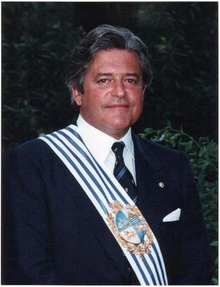
Back Luis Alberto Lacalle AN لويس ألبيرتو لاكايه Arabic لويس البيرتو لاكايه ARZ Luis Alberto Lacalle AST Luis Alberto Lacalle Catalan Luis Alberto Lacalle Danish Luis Alberto Lacalle Herrera German Luis Alberto Lacalle Spanish Luis Alberto Lacalle Estonian Luis Alberto Lacalle Basque
Luis Alberto Lacalle | |
|---|---|
 Official portrait, 1990 | |
| 36th President of Uruguay | |
| In office 1 March 1990 – 1 March 1995 | |
| Vice President | Gonzalo Aguirre |
| Preceded by | Julio María Sanguinetti |
| Succeeded by | Julio María Sanguinetti |
| Senator of Uruguay | |
| In office 15 February 2010 – 15 February 2015 | |
| Constituency | At-large |
| In office 15 February 1985 – 15 February 1990 | |
| Constituency | At-large |
| Chair of the National Party | |
| In office 17 August 2009 – 8 January 2011 | |
| Preceded by | Carlos Julio Pereyra |
| Succeeded by | Luis Alberto Heber |
| In office 11 April 1999 – 13 July 2004 | |
| Preceded by | Alberto Volonté |
| Succeeded by | Jorge Larrañaga |
| Representative of Uruguay | |
| In office 15 February 1972 – 27 June 1973 | |
| Constituency | Montevideo |
| Personal details | |
| Born | Luis Alberto Lacalle de Herrera 13 July 1941 Montevideo, Uruguay |
| Political party | National Party |
| Spouse | |
| Relations |
|
| Children | 2, including Luis Lacalle |
| Parents |
|
| Alma mater | University of the Republic |
| Occupation | Politician |
| Profession | Lawyer |
| Signature | |
Luis Alberto Lacalle de Herrera, (Spanish pronunciation: [ˈlwis alˈβeɾto laˈkaʝe ðe eˈreɾa]; Lacalle locally [laˈkaʒe] or [laˈkaʃe]; born 13 July 1941), is a Uruguayan politician and lawyer who served as the 36th president of Uruguay from 1990 to 1995. A member of the National Party, he previously served as National Representative from 1972 to 1973, and as Senator of the Republic from 1985 to 1990.
Lacalle was born and raised in Montevideo. He is the grandson of Luis Alberto de Herrera who led the National Party and founded one of its most prominent sectors. He attended the Jesuit Colegio Seminario and graduated from the University of the Republic in 1964 with a law degree. In his youth he worked as a journalist in some media outlets. From 1972 to 1973 he served as National Representative for the Montevideo Department, but lost his seat after the dissolution of parliament with the coup d'état carried out by President Juan María Bordaberry.
Lacalle was elected president in the 1989 election, which marked the return of the National Party to government since it was the ruling political group in the National Council of Government from 1963 to 1967, and the first election of a president for that party since Bernardo Prudencio Berro in 1860. His presidency was characterized by a liberal economic policy in line with the Washington Consensus. He carried out a fiscal adjustment and a reform to state-owned companies to deregulate them. This earned him opposition from the left and the union movement. In foreign policy, the Lacalle government signed the Treaty of Asunción that established the Southern Common Market (MERCOSUR).
After leaving office in 1995, Lacalle continued in active politics. In 1999 he ran for president again, finishing in third place. In 2004 he ran in the National Party presidential primaries, but was defeated by Jorge Larrañaga, who was the party's candidate in the general election. In 2009 he was a presidential candidate again but was defeated in the second round by the Broad Front nominee, José Mujica, who was elected president. With the victory of his son, Luis Lacalle Pou, in the 2019 general election, the two became the third father–son pair to serve as the nation's president.